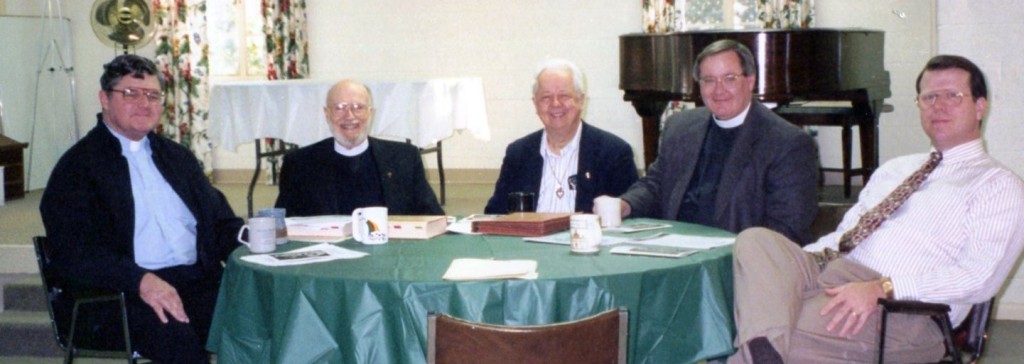One of the most significant seasons of my spiritual journey was with a small group of pastors in Moultrie, Georgia (circa 1990s) who met weekly to study the gospel text of the common lectionary. The group consisted of an ecumenical mix of two Episcopal priests, one Catholic priest, two Methodist pastors, one Baptist pastor, and me (the Pentecostal). One might wonder how such a group could meet without theological debate, but as we met each week and focused on our gospel study, we discovered we had more about which we agreed than disagreed. In this diversity, each person contributed from his ecclesiastical tradition and was eager to learn about the traditions of others. I have often said that it was in those meetings that I received my theological education.

Recently, I read Reform and Conflict, a history of the Reformation era. In reading the chapters on Luther, especially Luther’s commitment to sola scriptura, I was reminded of an incident that occurred in one of our weekly meetings. The Episcopal Church had adopted a measure affirming homosexuality. I don’t remember the details, but I do remember that Father Richard, the pastor of the local Episcopal Church, was livid. He vented for several minutes and concluded with the charge, “This means that the Episcopal Church has no teaching on human sexuality!” Then Father Ed, the local Catholic priest, made a remark that I vividly recall: “But what about the Bible!” I found Father Ed’s remark to be an amazing commentary on the state of the churches of the Reformation. Five hundred years after Luther, it was a Catholic priest reminding the descendants of the Reformation that we should be careful to consider the teaching of Scripture.
One of the marks of Protestant theology was sola scriptura, that is, the bible alone is the authority for faith and doctrine. The Protestants were not rejecting the history of the Church, but they were rejecting the various traditions that dimmed the vision of the Gospel. There were various ways by which the Protestants interpreted sola scriptura. Some Protestants allowed for church tradition as long as it did not conflict with the message of the Bible. Others rejected any tradition that was not explicitly taught in the Bible. The one thing they agreed upon was the authority of the Holy Scriptures.
However, many Protestants have seriously deviated from that basic conviction. Through the centuries some Protestants have rejected the authority of Scripture. They have developed a hermeneutic that is hyper-critical of the Bible. No longer is the divine inspiration and veracity of the Bible assumed; in many cases it is not even considered to be a viable conviction. Many Protestants (and some Pentecostals) have adopted a hermeneutic of Spirit over Word that suggests that the discerning minds of enlightened persons are more authoritative than the Scriptures. In this view, the important thing is not the inspiration of the biblical text, but the inspired and enlightened mind of the the contemporary interpreter. Of course, this assumes that those who hold to the tradition of the authority of Scripture cannot be inspired interpreters.
This protesting hermeneutic first attacked the doctrines of the Trinity, virginal conception and bodily resurrection of Christ. This protesting hermeneutic denies the concept of Truth in favor of many truths. Orthodoxy is considered passé and heterodoxy is the canon of the Faith. The most recent form of this protesting hermeneutic seeks to address the issue of human sexuality. From the acceptance of vulgar divorce in some of the most conservative churches, to the promotion of practicing homosexuals as clergy, and the acceptance of “same-sex” marriage, many in the church are protesting the traditional biblical teaching on sexual morality. In fact, sex is no longer a moral issue at all. Sex is utterly amoral. Those of us who dare suggest that the Bible is inspired and authoritative, that there is a biblically informed sexual ethic, are caricatured as Neanderthals who also want to reinstate slavery, keep women subjugated as domesticated servants to men, and justify genocide.
I fear that many post-modern Protestants have protested themselves out of the Faith. I’m aware of the difficulties of the ancient text and I’ve often found myself struggling with the various tensions within the Bible. The serious student of the Bible must be inspired by the Spirit, for the Holy Spirit is the primary teacher of the Faith (John 14:26; 16:13). In dialogue with the Spirit and the Word, we must always be careful not to quench the prophetic character of the Word (1 Thessalonians 5:19-22). We must affirm the inspiration and authority of the Bible as the primary source for the theological task (2 Timothy 3:16; 2 Peter 1:20-21). I have also learned that dialogue with the Great Tradition of the Church can serve as an anchor of the Faith (2 Thessalonians 2:15). The spirit-filled “apostles, prophets, pastors, teachers, and evangelists” of old who now comprise the “communion of the saints” can guide the church through the stormy winds of false doctrine (Ephesians 4:11-16). As we seek to navigate the present storms, I am grateful to the Catholic priest who reminded me to be faithful to the Bible.
